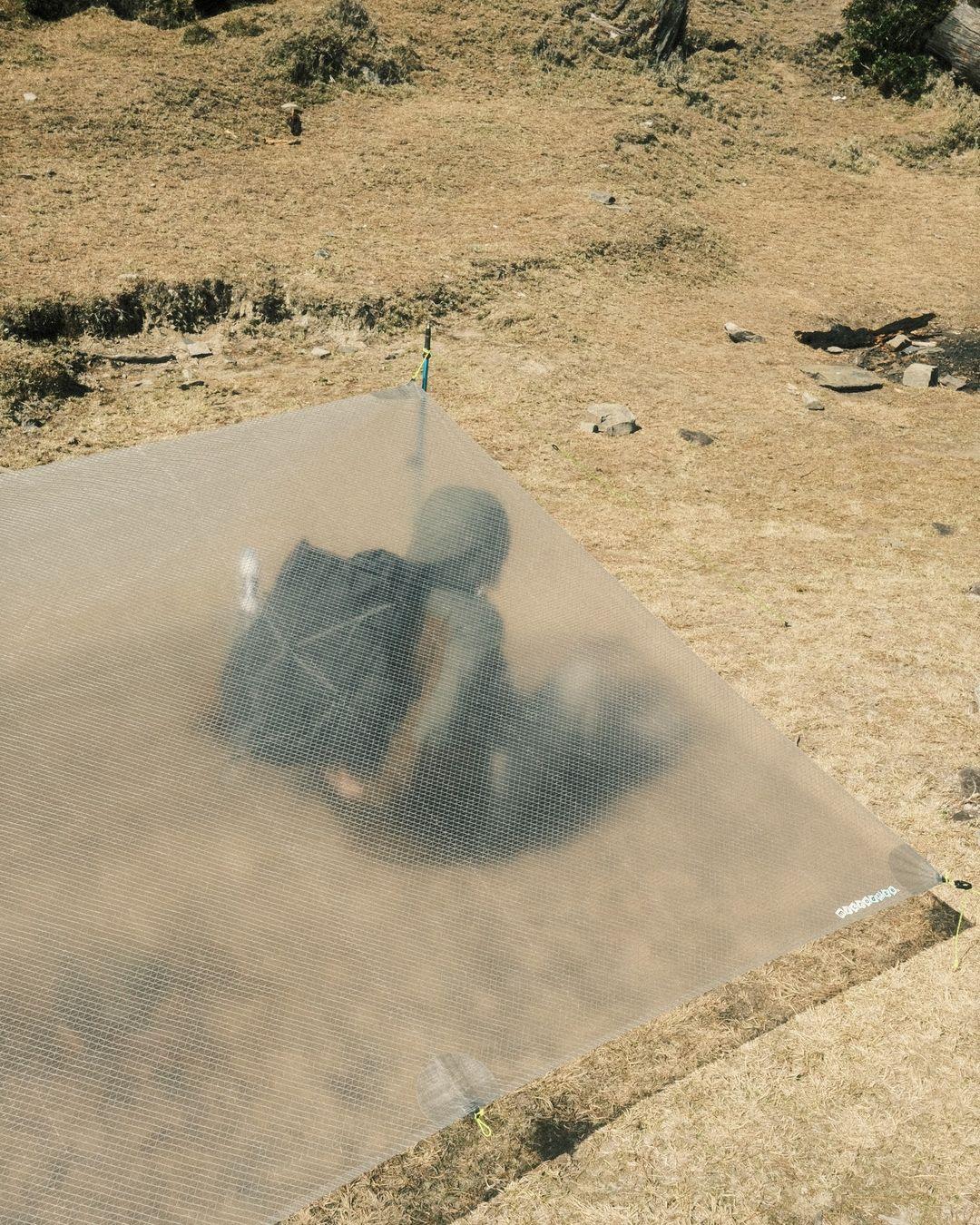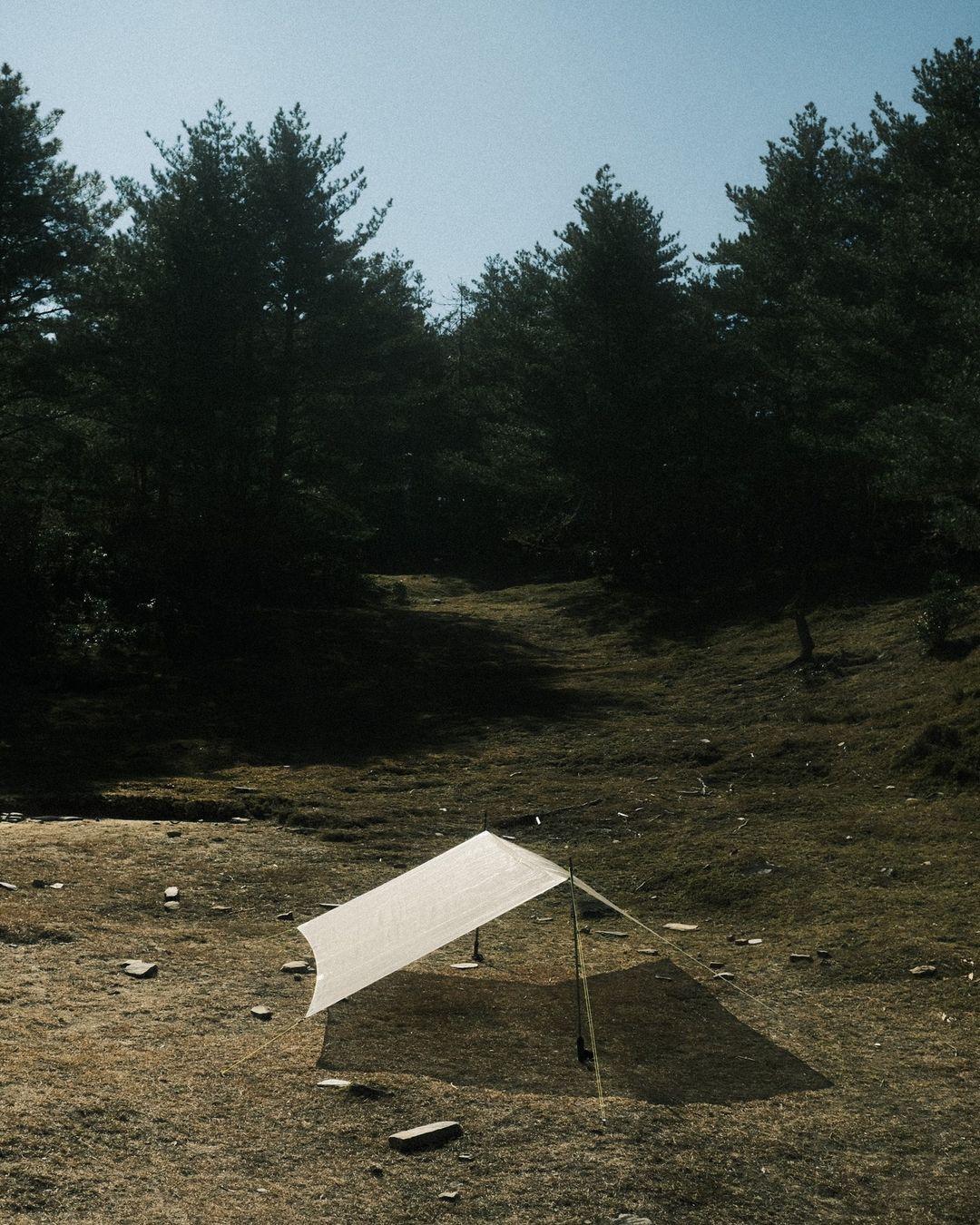Topic
First impression with Ultra TNT for a 3x3M tarp
Forum Posting
A Membership is required to post in the forums. Login or become a member to post in the member forums!
Home › Forums › Gear Forums › Make Your Own Gear › First impression with Ultra TNT for a 3x3M tarp
- This topic has 15 replies, 11 voices, and was last updated 1 year, 7 months ago by
 Henry Shires / Tarptent.
Henry Shires / Tarptent.
-
AuthorPosts
-
Mar 21, 2023 at 11:34 pm #3776711
My friend helped me to get some Ultra TNT fabric last year and out of it we were planning to make something interesting. I am so lazy (or actually so busy) that the first piece of work of a 3*3M / 9.8’*9.8’ square tarp was not out until last month.
Mar 21, 2023 at 11:41 pm #3776712According to Challenge Sailcloth, TNT stands for Tent and Tarp. It’s interesting name. When I told my friends the fabric name, they typically responded: “Is it the explosive?”

The total weight of the finished 3*3M tarp is 404g including basic guy lines and line locs. I think the fabric weights over 1.0 oz. One of the biggest advantage of TNT, unlike DCF, is the 1.52M fabric width that makes a 3*3M tarp possible. This is a favorite size as so many camping people came to ask me for this size in previous years.

My impressions after making the first tarp:
- Even stiffer than DCF – paper-like properties in terms of storage: you must fold and roll carefully; otherwise the package size is unacceptable.
- The making process is FUN to me. This fabric is even more deviated from “normal” woven fabrics. I think basically it’s grid reinforced PET films. Under normal conditions, no stretch & no stretch differentiation at all in ALL directions. But similar to DCF, if there is a deformation, it is permanent.
The variant should be kind of Challenge’s initial try. Being transparent is more of a disadvantage for shelters requiring privacy, though it allows you to enjoy the sunshine like vegetables in a glass room in winter. And the weight is also not ideal for UL/XUL. In the following picture, forgive me to use the DCF patch to reinforce TNT as this is not very polite. :-) But in my way of making the tie out system, it’s still quite technically appropriate.

In general, I see that since Ultra 100D/200D is becoming a success and Challenge is trying to offer more possibilities. As for MYOG and small cottages, I think we are glad to see more options in the market. I’ve just got the info that the next batch of TNT is no longer transparent and the fabric weight is also reduced to be around 1.0 oz or under. I’m expecting more new things to come.

All photo cred. goes to my friend @microdose
Mar 22, 2023 at 7:35 am #3776718Note that the newest TNT is .93 sq/yd and in a sage green medium translucent vs the more clear transparent. Testing…
Mar 22, 2023 at 4:37 pm #3776807Getting close! Challenge doing a good job at slowly chipping away at the previous best options in UL cottage materials in all aspects. I wonder if they plan on entering the breathable sleeping bag fabric category in the future…
Thanks for sharing!
Mar 22, 2023 at 8:11 pm #3776818They make sails, which don’t need to breath :-)
Mar 25, 2023 at 6:56 pm #3777170Hi Brook; I’m not familiar with the “3*3” notation for the meters. Could you enlighten me a bit.
Also, can you provide the Length by Width dimensions of the tarp, and where the material might be acquired. I’d love to apply a thin coat of silicone to the material and see if it softened it. Thanks.
Mar 26, 2023 at 6:39 am #37772193*3M / 9.8’*9.8’
I think that mean a square tarp that is 3 meters by 3 meters or 9.8 feet by 9.8 feet.
Mar 26, 2023 at 7:42 pm #3777313Ultra TNT looks amazing, even in the clear. Is anyone selling the 3M X 3M?
Mar 28, 2023 at 5:32 pm #3777496Thank you, Matthew. That squares with the thread (except Ron Bell’s .93 [oz ?] sq/yd) and would run about the same as the better polyesters, such as Yama’s for example, which weighs 1.08 oz/sq/yd. However, the OP’s conclusion that deformation would be permanent would not meet my criteria for a tent.
Jun 1, 2023 at 6:29 am #3782336Challenge has some nice pictures of shelters built with Ultra TNT by Tarptent, Yama and LiteAF. Scroll down for a slideshow:
Jun 1, 2023 at 7:03 am #3782338etowahoutfitters offers Ultra TNT flat tarps in 6 different sizes. Their prices always seem to be about as reasonable as you can get.
https://www.shop.backpackingadventuregear.com/NEW-Ultra-TNT-Tarps-TNTTarp.htm
Jun 4, 2023 at 11:07 am #3782596Challenge’s photo of a TNT tent looks like a Scarp from TarpTent. But could not find a TNT shelter on TT’s site. Either missed it, or it is not yet in production. Did find the following on TT’s page on fabrics, however:
“What is Ultra TNT?
Ultra TNT is a 0.94oz/yd laminate fabric made by Challenge Sailcloth. Ultra TNT consists of 200D UHMWPE fibers laminated between 0.25mil Mylar films. This film-scrim-film construction is similar to that of DCF. The key difference between Ultra TNT and 1oz/yd DCF (CT2K.18) is that Ultra TNT has more widely spaced but thicker fibers of UHMWPE and those fibers run in three directions rather than just two as in DCF.“In our testing, Ultra TNT matches or outperforms 1oz/yd DCF in most ways. The biggest performance advantage of Ultra TNT is that the fabric is stabilized by UHMWPE fibers in three directions instead of just two. This means Ultra TNT is more dimensionally stable than DCF which decreases the amount of deformation of the fabric under load. This superior stability reduces the strain on the Mylar films increasing durability along with making the fabric extremely ridged when well pitched. The coloration of Ultra TNT is also more opaque than DCF, meaning more privacy inside.
“The main weakness of Ultra TNT compared to DCF is that the wider gaps between UHMWPE fibers mean that it does not like to be sewn without added reinforcement. When stitched needle holes tend to tear the Mylar up to the next UHMWPE fiber. This also occurs in DCF but to a much lesser degree as the fibers are much closer together. Because of this, we use fully bonded construction for Ultra TNT rather than the hybrid sewn and bonded construction we use with DCF. These gaps are also why Ultra TNT does not make for a good floor material as small points (such as a stick) can puncture the areas of mylar between the UHMWPE fibers.
“The other benefit of Ultra TNT is cost. At roughly half the price of DCF, Ultra TNT is not only better performing in many ways but also leads to much more affordable tents.”
So maybe TT may be coming out with a TNT shelter. But looking at photos, it does not appear that the TNT canopies are as “extremely ridged [sic]” as suggested, even with the diagonal threads in the lamination. And there are the concerns about puncture and sewing, as well as noise and packability. So remain unsure about TNT being a replacement for woven fabrics.
Jun 4, 2023 at 7:05 pm #3782613> But looking at photos, it does not appear that the TNT canopies are as “extremely ridged [sic]” as suggested, even with the diagonal threads in the lamination. And there are the concerns about puncture and sewing, as well as noise and packability.
Thanks for catching the “rigid” spelling error. All fixed now. The intended meaning is that UltraTNT has measurably less permanent deformation over time compared to DCF. A well pitched, well designed DCF structure will start out life with taut/rigid panels but suffer over time from permanent deformation due to stretch through the bias, and most especially from mid panel pullouts pulling orthogonal to the surfaces. Once that happens “rigid” panels are no longer possible, at least through stressed regions. In our testing, UltraTNT suffers much less permanent stretch and thus panel tension is better over time.
Jun 12, 2023 at 10:02 pm #3783233Thank you, Henry. That is very helpful.
Jun 13, 2023 at 3:44 am #3783240Does this TNT stuff roll up to similar packed volume to DCF? Or is larger due to its extra stiffness?
Jun 14, 2023 at 11:14 am #3783335> Does this TNT stuff roll up to similar packed volume to DCF? Or is larger due to its extra stiffness?
Yes, similar to DCF. We’ll have/post some some data for comparable packed size relative to nylon in a few weeks.
-
AuthorPosts
- You must be logged in to reply to this topic.
Forum Posting
A Membership is required to post in the forums. Login or become a member to post in the member forums!
Our Community Posts are Moderated
Backpacking Light community posts are moderated and here to foster helpful and positive discussions about lightweight backpacking. Please be mindful of our values and boundaries and review our Community Guidelines prior to posting.
Get the Newsletter
Gear Research & Discovery Tools
- Browse our curated Gear Shop
- See the latest Gear Deals and Sales
- Our Recommendations
- Search for Gear on Sale with the Gear Finder
- Used Gear Swap
- Member Gear Reviews and BPL Gear Review Articles
- Browse by Gear Type or Brand.







